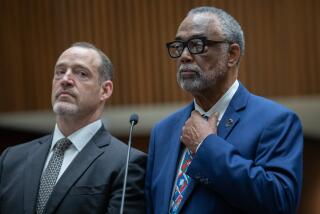No Favoritism, Pierce Says of Tenure at HUD
- Share via
WASHINGTON — Former Secretary of Housing and Urban Development Samuel R. Pierce Jr. on Thursday defended his performance at HUD, denying allegations of political favoritism and contending that his actions during eight years in the Ronald Reagan Cabinet have been misinterpreted.
Pierce said also in an interview that he believes some members of Congress are now attacking his operation of HUD because, under his administration, consultants sometimes usurped the traditional role played by congressmen in obtaining HUD grants.
No Points for Republicans
“Everybody was treated the same,” Pierce said. “That was the advice and the word that I gave to the people at HUD. You would look at their project and, if it was a worthy project, they would be treated favorably. If not, they would lose it. That was the basic approach to all of these. It wasn’t an approach that, if they are a Republican, you have got to add 10 points or give them something extra.”
Pierce’s remarks during the interview were his first public comments on the furor surrounding his years at HUD since he testified before Congress on May 25. He has been recalled to testify again on Sept. 15.
Since Pierce’s first appearance before Congress three months ago, testimony by former HUD officials and thousands of pages of documents have painted a picture of mismanagement and influence peddling during his years at the helm of the giant agency.
Rep. Tom Lantos (D-San Mateo), who is heading the congressional inquiry, has said that some of the recent evidence appears to contradict Pierce’s initial testimony. Lantos has suggested that some witnesses may have committed perjury.
In addition to denying that high-powered Republicans were granted special treatment while he was at HUD, Pierce said that:
--His May testimony that he was not a “hands-on” manager has been misinterpreted and that he was involved directly in many decisions as HUD secretary throughout both terms of the Reagan presidency.
--He was unaware of the extensive influence exercised by his former executive assistant, Deborah Gore Dean, in deciding which projects would receive millions of dollars in grants under HUD’s moderate rehabilitation program.
Explains Action on DRG
--He lifted restrictions on DRG Funding Corp., over the objections of some staff members, in the hope that the Washington mortgage company could resolve its financial problems and avoid millions of dollars in losses on HUD-insured mortgages.
--His efforts to help former law partners did not constitute a breach of his pledge during his Senate confirmation hearing to sever ties with his former New York law firm because he received no financial benefit from the favors and had no agreement to return to the firm.
In the three months since his testimony before the House Government Operations subcommittee on employment and housing, a series of disclosures has portrayed Pierce as playing an active role in assisting former colleagues and prominent Republicans in HUD-related matters.
The lawyer and former New York judge said he is looking forward to “setting the record straight” when he testifies next month and a third time in October. Because of the pending testimony and what he said was an agreement with an unidentified magazine to publish his complete story next month, Pierce refused to discuss certain topics.
Funded Housing Project
One such subject was the reason he ordered a HUD assistant secretary in 1985 to fund a housing project in Durham, N. C. The project was opposed by many HUD staff members but was supported by the Republican mayor of Durham, who was a former law colleague of Pierce, and by a former Reagan campaign strategist.
“I had what I think, anyway, were good reasons, but I will have to save that for the subcommittee,” he said.
Pierce was more forthcoming in describing one reason he believes some congressmen have been critical of HUD.
He said he felt that many congressmen were angered because their traditional role in lobbying HUD for grants had been taken over in part by outside consultants. Developers have testified that they paid substantial sums to consultants because they felt that doing so was essential to obtaining favorable HUD action in the Pierce years.
“Some of these congressmen, they are saying, ‘Nobody can get you this (HUD approval) but us. This is our job, and we don’t want any competition,’ ” he said.
Lobbied by Lawmakers
Pierce would not identify specific lawmakers, but he said that many representatives and senators lobbied him extensively for HUD projects in their districts.
In May, Pierce provoked an angry response from Rep. Barney Frank (D-Mass.) when the former secretary questioned why no Democrats had been identified in the emerging HUD scandal.
That same day, Pierce responded to a question from one congressman by saying he was not a “hands-on” manager. He testified also that he was not involved in recommending funding for specific projects.
He did testify, however, that he sometimes instructed staff members to look at a project and fund it if they thought it was a good one.
Testimony by others, as well as documents released since then, show that Pierce was involved directly in some projects.
“Of course, I was involved in making decisions and recommendations,” he said in the interview. “You can’t be in a job for eight years and not make a decision. I will address that in my opening remarks to the committee next month, out of my mouth, on the record.”
Won’t Provide Reasons
He said he took a personal interest in a limited number of projects; but, in most instances, he refused to provide reasons. He maintained steadfastly, however, that projects were approved only on merits.
“They had to have a meritorious claim in order to get an award,” Pierce said. “And you will notice that a number of those people have said, when quizzed by the newspapers, that, ‘Yes, I may have gotten one request, but I didn’t get two others,’ or ‘I got this one and I lost that one.’ ”
As an example, he cited Carla Anderson Hills, who was a Washington lawyer after serving as HUD secretary in the Gerald R. Ford Administration. He said that Hills, now U.S. trade representative, met with him on behalf of clients at least four times and was turned down twice.
One occasion when Hills was not turned down was in 1985, when she appealed to Pierce on behalf of DRG Funding Corp. She was trying to persuade Pierce to rescind an order suspending DRG’s authority to make loans under HUD’s coinsurance program without submitting them to the agency for approval.
DRG was one of the largest companies involved in the coinsurance program, which allowed the company to make loans for affordable rental housing. The loans were insured 80% by HUD. By 1984, however, a substantial number of DRG’s loans were in default, and top-level HUD staff members were trying to suspend the company from the program.
In defending his decision not to suspend DRG, Pierce said that he had been convinced by some of his staff that the company, which had a long involvement with HUD, had a chance to restore its finances. Suspending DRG in 1984 or 1985 would also have resulted in substantial losses to HUD, he said.
Kemp Suspends Company
Pierce’s successor as secretary, Jack Kemp, suspended DRG from all federal programs earlier this year, and the Justice Department is investigating the company. Government losses from DRG loans are expected to reach $500 million.
The spark for the congressional inquiry was HUD’s moderate rehabilitation program, which provided funding to repair rental housing for low-income people and the elderly. Testimony before the subcommittee has depicted the program as beset by favoritism. Much of the criticism has been focused on Dean, the former Pierce assistant.
Pierce said he had tried to kill the moderate rehabilitation program for six years, but Congress rebuffed him each time. He said Congress provided funds for the program but not enough staff to monitor it effectively.
As a result, he said, he set up a three-person committee of subordinates to decide which projects would receive “mod rehab” funds. Dean was a member of the group, and Pierce said that he had assumed the structure was working until testimony at the congressional hearings this summer disclosed that Dean made many of the funding decisions herself.
One HUD official who was supposed to be on the committee told the agency’s inspector general that he had participated in very few of the decisions and that Dean had been the primary decision-maker.
“I didn’t find out until the hearings that it was working that way,” Pierce said. “I had a damn good right to think that it was working right.”
Dean has refused to testify before Congress so far. Through her lawyers, she has asserted that funding decisions at HUD were made by Pierce.
Two of her attorneys, Charles Leeper and Joseph Artabane, said Thursday: “We welcome the news that Secretary Pierce has corrected his prior testimony that he was not involved in HUD funding decisions.”
Documents released by HUD in recent weeks show that Pierce did favors for former law colleagues. In one instance, he met with a former law partner, Martin Edelman, concerning the award of a $4.5-million HUD grant to convert an aircraft carrier into a museum in New York.
Pierce’s HUD files show that one of Pierce’s former law clients was trying to turn the carrier Intrepid into a nonprofit sea, air and space museum. The clients were represented by Edelman at the time.
‘I Did Try to Help’
“I remember talking with Edelman about it,” Pierce said. “This was a charitable venture, and the people who were responsible for it were putting in millions of dollars of their own money to make it a reality. I don’t remember exactly what I did with that doggone thing. But I know I did try to help to some extent.”
Pierce said favors for his former law colleagues did not, in his opinion, violate the pledge to sever ties with the firm that he had made at his confirmation hearing before the Senate in 1981.
“What I thought and believe ‘sever all ties’ meant was that you broke your relationship with the firm, your business relationship, so that you didn’t get any more money from the firm,” he said .
More to Read
Get the L.A. Times Politics newsletter
Deeply reported insights into legislation, politics and policy from Sacramento, Washington and beyond. In your inbox twice per week.
You may occasionally receive promotional content from the Los Angeles Times.










